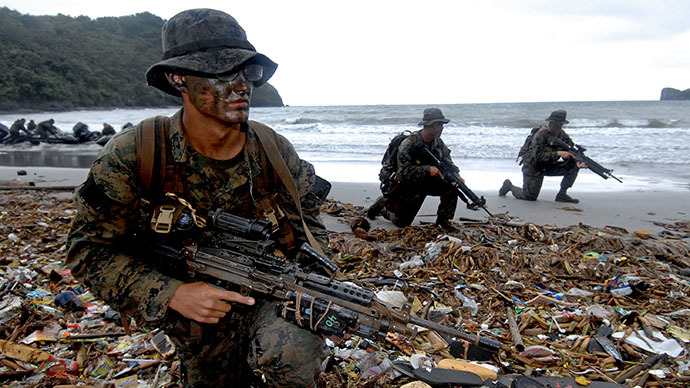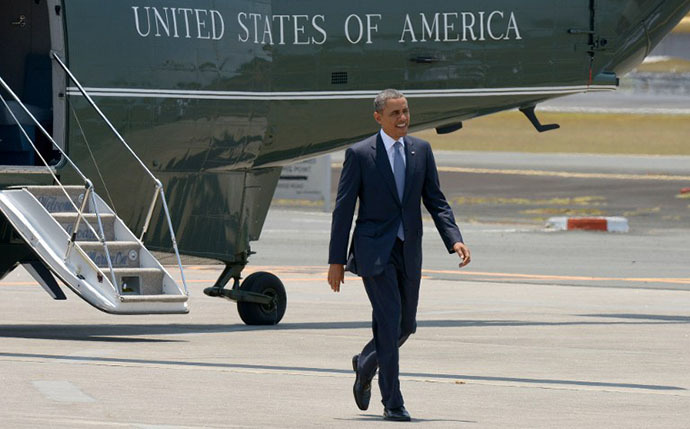‘China, US looking for economic stimulus that comes from militarization’

Neither China nor the US are interested in full-on military confrontation but both want to play up the potential for it as it allows them to divert more government funds to the defense sector, editor of an independent news web site James Corbett told RT.
Amid increasing tension in the South Pacific region, especially over America’s growing military footprint, it is reported the Philippines is transforming Ulugan Bay and nearby villages into a major naval base that may host US warships. Ulugan is only 160 kilometers from the Spratly archipelago, a fiercely contested area in the South China Sea.
RT:What will this "military upgrade" mean for the villagers themselves?
The Philippines and the United States signed a 10-year security pact when US President Barack Obama visited Manila in April. It could soon allow a much greater American military presence on Filipino soil, including on expanded bases. In May the two countries carried out two weeks of naval war games.
James Corbett: We have to look at the examples of other parts of this region that have been militarized in similar ways and perhaps one of the analogies that comes to mind is Okinawa in Japan, where the residents have been fighting a decades-long battle against the US military in terms of their base in Okinawa and some of the problems that have been caused by it, including plane crashes and even rapes by some of the military personnel who have been stationed there of some of the local populations. That has become a pretty large sticking point for the locals in Okinawa, and it does provide at least a pattern that we might look for in terms of building up these bases in other areas of the region.
RT:Do you think that the creation of military base will indeed help to solve the territorial disputes in the area?
JC: It is unlikely that the creation of this base will solve any dispute so much as inflame the disputes that are already ongoing. This is quite demonstrable from the fact that several million dollars are going to be spent apparently to upgrade this base, but just to put that into comparison, the Chinese military spent 119 billion dollars last year on its total defense budget. I think that this is really just a drop in a bucket when it comes to actual defense in the region, but it does show that the Philippines are becoming more and more determined to put up some type of military defense against what China is doing, especially in the Spratly Islands archipelago. And they are doing so by increasingly turning to the US, which of course only further inflames some of the tensions that are developing now between the US and its allies in China.
RT:According to Philippines officials, these initiatives are aimed at balancing China's military expansion in the region. So maybe it is a rational move after all?
JC: I don’t think that this is rational maneuvers on either side. I think what is really going on is both China, the US and its allies are playing to their respective political bias and they are looking for economic stimulus that comes from militarization, so they are looking to divert more government funds towards the defense sector. If that is the intended consequence, I think what we are seeing developing in the Asia-Pacific region is the prime example of that and it’s a very successful operation in that regard. I don’t think either side is really interested in full-on military confrontation at this point because I don’t think this would play into either side’s long-term strategic interests in the region. But both are very interested in playing up the potential for such confrontation because it allows them to further centralize control militarily and politically as they continue towards ramping up these tensions in the conflicts. And of course it allows China the excuse to go further and further towards making on-the-ground reality in the South China sea towards so-called 9-line, have been trying to make a reality of the naval presence. These types of tensions and the supposed response that they are now doing to the supposed aggression from the other side is a convenient justification for that.

RT:Earlier, the Philippines signed an agreement letting the American Navy operate at some of its bases. What this increasing cooperation mean for the region?
JC: This has to be seen in the context of the developing and furthering military relationship between the US and Philippines. We could look back into January of this year when the Philippines announced they were looking to buy two frigates from the US Navy and then in April there was an announcement of the agreement between the US and Philippines for extended and deepen US military access to the Philippines that is a part of the 10-year agreement. And now we see this latest maneuver movement to building up a forward base in the Spratly Island archipelago. This has to be seen as a part of the trend towards deepening the US-Philippine military alliance. That goes right along with developing US-Japanese military alliance, US-Malaysian military alliance, US-Indonesian military alliance, US-Australian military alliance. So this has to be seen as more part of the regional trend which is developing, but it certainly is interesting to watch how the US is gaining more access to the region generally and to the Philippines in particular where they weren’t necessarily welcomed with opened arms just a few years ago.
RT:How can you characterize the US military build-up in the Asia-Pacific?
JC: I think that one way of looking at it, either we can look at this as a process of encirclement China is responding to, or we can look at the very aggressive moves that China has been making in the South China Sea trying to push some of the claims against some of the territorial neighbors. Both elements are at play. I don’t think it is necessarily a cause and an effect situation, its part of the feedback loop where one side makes a move, the other seems to respond to it, so the other side responds to the response, and it just keeps building upon itself.
When you are caught in this type of feedback loop, it runs the risk of running into some type of military confrontation scenario not only necessarily because any of the politicians involved want that to happen, but simply because when you have all of these ships in these highly disputed territories that are at times running into each other, as we have seen recently for example in the Vietnam exclusion zone where there have been attempts to place a Chinese oil rig, we start to see this type of incidents that could become a hard-war scenario perhaps inadvertently. As we sit on the hundredth anniversary of the start of WWI, that started because of the assassination of a politician in Eastern Europe, that I don’t think anyone could have foresaw to become global conflict, we have to at least keep this precedent in mind as we watch the increasing militarization in the Asia-Pacific region.
RT:What kind of interests does America have in Asia? Is it just counterbalancing China?
JC: I wouldn’t justify that. I think the American administration would attempt to justify it by the fact that of course America as a Pacific nation does have an interest in what is happening in the region and that can be seen in more examples. I’m sure they will try to point at the precedent of Pearl Harbor back in 1941 and the fact that the Japanese imperial movements in East Asia did turn out to have an effect on the US directly as Pearl Harbor was attacked. The US has naturally had an interest in the region for a very long time and has for a very long time been a de facto military power in the region. It’s a power that tends to operate through proxies, most notably perhaps Japan, which became part of the US military umbrella since the time of the occupation after the WWII. At this point the argument that would be put forward is that if China was simply allowed to aggress and to gradually expand its presence into territorial disputed areas, then it would eventually have the effect on the US. That’s the way that it would be framed by the US Administration and it was quite explicitly put by Chuck Hagel at the Asia Defense Forum last month where he said that China was a destabilizing presence in the region and if we want to maintain the status quo, it will require the cooperation of the US with many of its allies in the region to make sure that China doesn’t destabilize that region.
The statements, views and opinions expressed in this column are solely those of the author and do not necessarily represent those of RT.
The statements, views and opinions expressed in this column are solely those of the author and do not necessarily represent those of RT.












